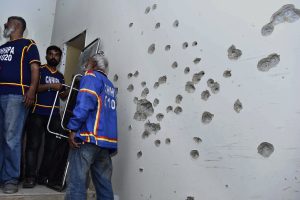Umair Jamal

The Tehreek-e-Taliban Pakistan (TTP)’s latest attack on the Sindh Police Force’s headquarters in Karachi has prompted concerns that the militant outfit has regained space beyond its traditional strongholds in the country’s tribal areas bordering Afghanistan.
Following the Karachi attack, the TTP warned of more attacks against Pakistan’s law enforcement agencies. “We want to warn the security agencies once again to stop martyring innocent prisoners in fake encounters otherwise the intensity of future attacks will be more severe,” the extremist group said in a statement.
The assault in Karachi comes weeks after a suicide bomber killed more than 100 people at a mosque in the northern city of Peshawar. The blast, which was claimed by a faction of the TTP, was one of the deadliest attacks on Pakistan’s security forces in recent years.
After the attack in Karachi, Pakistan’s new Chief of Army Staff Gen. Asim Munir visited the city and issued a noteworthy statement, indicating that the continuing political deadlock may dent the chance for a coordinated response against militancy. “Contrary to political and other distractions being faced by the public, security forces remain singularly focused on Counter Terrorism and Intelligence-based operations (IBOs) which are being conducted all over the country with pronounced success,” he said.
Munir emphasized that “no nation can overcome terrorism-related challenges with kinetic actions alone.” “Mutual trust, will of the people, and synergy between all stakeholders” was required to defeat the menace of terrorism and extremism in all its manifestations, he said.
“Together we shall prevail upon this menace for a shared prosperous future,” the army chief vowed.
While there is a sense of urgency in Pakistan about dealing with the wave of militancy, the country’s political elite seem to have not fully comprehended the gravity of the situation. This goes for political parties that are part of the government as well as those in the opposition. For instance, after the Karachi attack, Minister for Interior Rana Sanaullah said that the government was under the impression that terrorists did not have access beyond Khyber Pakhtunkhwa and Balochistan provinces. “But now we can see they can reach other cities,” he said.
The statement gives the impression that the interior minister was waiting for the incident to happen to find out about the TTP’s influence and presence rather than adopting a proactive approach that also involves bringing all stakeholders together to deal with the problem.
Moreover, the problem has also been compounded by the political parties’ efforts to politicize the issue of militancy in order to settle scores with opponents.
Pakistan Tehreek-e-Insaf (PTI) chairman Imran Khan has maintained that the government is making efforts to use the issue of terrorism to delay provincial elections in Khyber Pakhtunkhwa and Punjab. For several weeks now, the former premier has tried to link the removal of his government with the rise in terror attacks in the country. He has also described as “suspicious” Khyber Pakhtunkhwa Governor Haji Ghulam Ali’s letter to the chief of the Election Commission of Pakistan requesting that the commission take into account the prevailing security situation while making decisions on the next elections.
This is a very problematic and worrisome approach on the part of a major political party as it suggests that terror incidents are being depicted as part of a design to delay elections in the country. In a country where the leading national parties have failed to develop political consensus, pushing such an approach could lead to further polarization.
Pakistan’s political parties should understand that the TTP is investing significant resources and efforts in churning out propaganda to weaken Pakistan’s polity and undermine public confidence in the security forces.
The TTP’s statement after the Karachi attack was noteworthy in this regard. “The policemen should stay away from our war with the slave army, otherwise the attacks on the safe havens of the top police officers will continue,” TTP warned in its statement.
Pakistan cannot afford to have key institutions divided over the issue of terrorism at this point. Splits, rifts, and politicization of the issue will only help the TTP and its facilitators in Afghanistan in advancing their goals.
Pakistan’s ruling elite needs to understand that for politics to continue and elections to take place, robust efforts that can lead to sustainable peace are important.
No comments:
Post a Comment